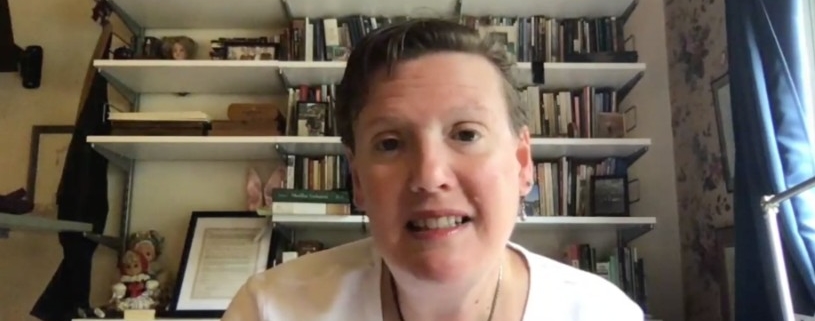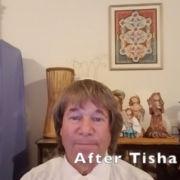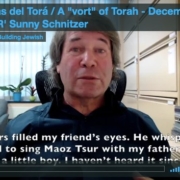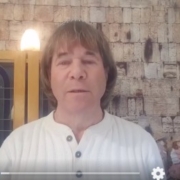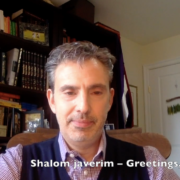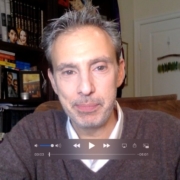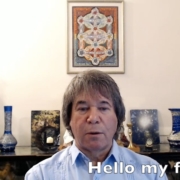Palabras del Torá / a “vort” of Torah from R’ Rachel Barenblat
Each month Bayit offers regular video “vorts” (words of Torah / teachings from Jewish tradition) offered in or translated into Spanish, designed for Cuban Jewish communities and available to Spanish-speaking Jews everywhere. This month’s video offering features a teaching from Rabbi Rachel Barenblat. The text follows the video, in Spanish and then in English.
Shalom javerim,
En nuestro calendario laico es septiembre. En el calendario judío, estamos en el mes de Elul, el mes que nos conduce a las altas fiestas.
Algunos enseñan que durante este mes debemos reparar nuestra relación con Dios y con la tradición judía, para que en los diez días de teshuvá entre Rosh Hashaná y Yom Kippur podamos reparar las relaciones entre nosotros.
¡Otros enseñan que durante este mes, debemos reparar las relaciones entre nosotros para que durante los diez días de Teshuvá podamos reparar nuestra relación con Dios!
En ambos casos, esta es una época para la introspección y para discernir cómo debemos cambiar en el año por venir.
En Rosh Hashaná el mundo vuelve a comenzar. El nuevo año trae nuevas oportunidades para escoger: ¿Qué persona queremos ser? ¿Cuál será nuestra relación con la tradición judía y con nuestra Fuente? ¿Cómo serán nuestra relación con los demás?
Las terribles realidades del coronavirus nos recuerdan que las acciones y elecciones de cada persona pueden afectar a toda la comunidad. Hemos aprendido cuán fácilmente este virus se esparce, aún por personas que no saben que son portadores.
Mis elecciones y comportamientos no sólo ponen en riesgo mi salud y mi seguridad sino la de mi familia y mi comunidad y la de todos a mi alrededor. Porque todos estamos interconectados.
Esta interconexión es lo que me da esperanza al aproximarnos al nuevo año.
Si trabajamos juntos podemos usar esta interconexión para lograr grandes cosas. Detener la expansión del virus. Protegernos los unos a los otros. Ayudarnos los unos a los otros. Compartir y elevarnos los unos a los otros.
El Talmud enseña “kol Israel arevim ze bazé” “todo el pueblo de Israel es responsable el uno del otro.” Es decir, nosotros. Somos descendientes de Jacob, quien se volvió Israel cuando luchó toda la noche con el ángel y recibió un nuevo nombre al alba. Somos responsables el uno del otro. Es nuestro trabajo ocuparnos de los demás en cualquier forma que podamos, porque estamos interconectados.
En Cuba, el otoño pasado presencié la fuerza y conexión de sus comunidades. Ustedes no necesitan el Talmud para saber que son responsables el uno del otro: ustedes lo viven, por quiénes son y por cómo viven.
He aquí otra cosa que me da esperanza: la interconexión más fundamental es verdadera, estemos o no estemos juntos en persona.
Por supuesto que quiero abrazar a mis seres amados distantes en este momento. He estado extrañando esos abrazos por meses. Pero el amor que nos tenemos dura aún cuando no nos podemos tocar. Del mismo modo que mi cariño por ustedes perdura, aún cuando no puedo estar presente con ustedes.
Todos los días de Elul, hay una costumbre de rezar el Salmo 27. Al final de éste viene el siguiente versículo: “Confía en Dios, mantén tu fuerza, abre tu corazón y confía en Dios.”
Nuestra tarea en esta época de teshuvá es aferrarnos a la esperanza. Fortalecernos, abrir nuestros corazones el uno al otro y aferrarnos a la esperanza. Aún en tiempos de pandemia o dificultad, aún cuando el mundo a nuestro alrededor parece carecer de sentido.
La palabra hebrea “teshuvá” es muchas veces traducida como “arrepentimiento” y a veces como “retorno”. Esta temporada nos llama a retornar a nuestro más alto y mejor ser. Las torá nos recuerda que la teshuvá no se encuentra en el cielo o más allá del mar, donde no podemos alcanzarla. La teshuvá está muy cerca, en nuestros corazones.
Y nuestros corazones saben que nuestra tarea en estos tiempos de pandemia es cuidar los unos de los otros. Porque lo que acaece a una persona impacta al resto. Porque nuestra interconexión nos hace fuertes, nos transforma en una comunidad, aún cuando estamos lejos.
Que este nuevo año traiga salud, prosperidad, seguridad y dulzura para todos.
Shalom chaverim.
On the secular calendar it is September. On the Jewish calendar, we are in the month of Elul, the month that leads us to the Days of Awe.
Some teach that during this month, we should repair our relationship with God and with Jewish tradition, so that during the Ten Days of Teshuvah between Rosh Hashanah and Yom Kippur we can repair our relationships with each other.
And others teach that during this month, we should repair our relationships with each other, so that during the Ten Days of Teshuvah we can repair our relationship with God!
Either way, this is a season for looking inward and discerning how we need to change in the year ahead.
At Rosh Hashanah, the whole world gets to begin again. A new year brings new opportunities to choose. Who do we want to be? What will be our relationship with our Jewish tradition and with out Source? What will be our relationship with each other?
The terrible realities of the coronavirus remind us that each person’s actions and choices can impact the whole community. We have learned how easily this virus can spread, even through people who do not know they are carriers.
My choices and behaviors risk not only my own health and safety, but that of my family, and my community, and everyone around me. Because we are interconnected.
That interconnectedness is what brings me hope as we approach the new year.
If we work together, we can use our interconnectedness to do great things. To stop the spread of the virus. To protect each other. To help each other. To care for each other. To share with each other and uplift each other.
Talmud teaches “kol Yisrael arevim zeh bazeh,” “all of Israel is responsible for one another.” That means us. We are the spiritual descendants of Jacob, who became Yisrael when he wrestled all night with an angel and at dawn received his new name. We are responsible for one another. It’s our job to take care of each other in whatever ways we can. Because we are interconnected.
In Cuba last fall I witnessed the strength and connectedness of your communities. You don’t need Talmud to tell you that we are responsible for one another: you live it, because of who you are and how you are.
Here is another thing that brings me hope: our most fundamental interconnectedness is true, whether or not we are together in person.
Yes, of course, I want to hug my far-away loved ones right now. I have been aching for those hugs for months. But the love between us endures even when we can’t touch. Just as the caring I feel for you endures, even when I am unable to be with you in person.
It is traditional to pray Psalm 27 every day during Elul. At the end of that psalm comes the verse, “Keep hope in God; keep strong, and open your heart wide, and keep hope in God!”
Our task in this season of teshuvah is to hold on to hope. To stay strong, to open our hearts to each other, and to hold on to hope. Even in times of pandemic or hardship, even when the world around us may seem hopeless.
The Hebrew word teshuvah is sometimes translated as repentance, and sometimes as returning. This season calls us to return to our highest and best selves. Torah reminds us: teshuvah is not in the heavens, or across the sea, where we cannot reach it. Teshuvah is as near as our own hearts.
And our hearts know that our task in this pandemic time is to take care of each other. Because what happens to one person impacts the whole. Because our interconnectedness makes us strong, and makes us into a community, even when we are apart.
May the new year that is coming bring health and prosperity, safety and sweetness for us all.

By Rabbi Rachel Barenblat. Translated by Rabbi Juan Mejia.

